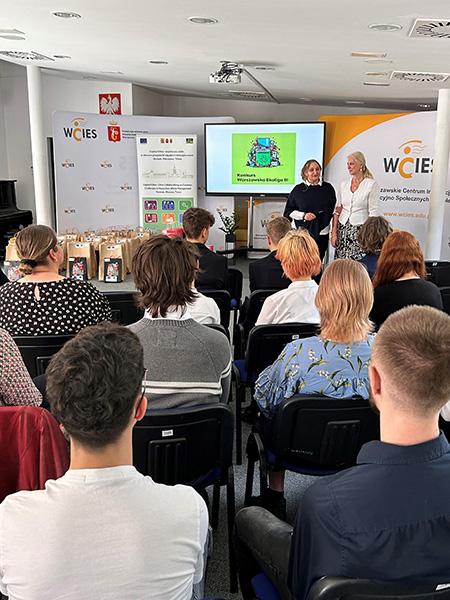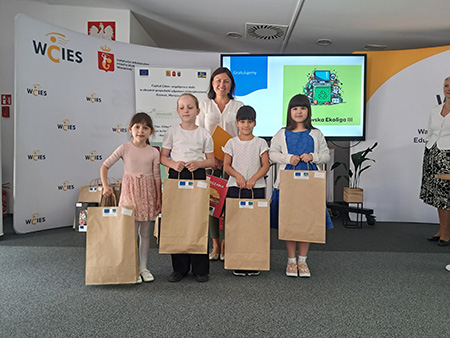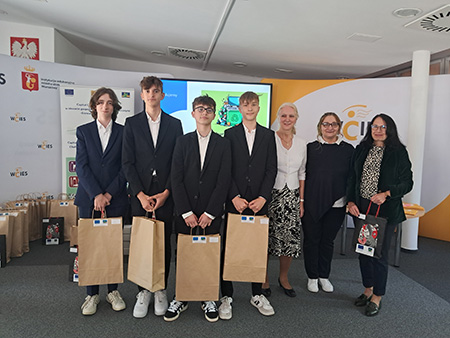23.05.2024



Warsaw Ecoligue III
The third edition of the competition “Warsaw Ecoligue III. Advice on electro-waste, or what to do with electro-waste”. It was attended by pupils and students of Warsaw schools and teachers, who competed in a new category.Electro-waste is an increasingly popular topic
According to the WHO, this is the category of waste whose production is growing the fastest. It is impossible to avoid them in our daily lives. We produce them in homes, schools and workplaces. In recent years, public awareness of this topic has been slowly increasing, but despite this, we often don't know what to do when it comes time to get rid of them. In this year's competition, students were tasked with finding, proposing and presenting solutions for their disposal.
Creatively about electro-waste Students approached the topic in different ways. They created posters, videos, informational newspapers, infographics, presentations, and even board games and animations. Teachers, in turn, prepared lesson plans to introduce students to what electro-waste is and how to dispose of it properly. The winners were rewarded with in-kind prizes: smartwatches, smartbands, solar mats for charging small devices or hiking backpacks and water filter bottles. Teachers, meanwhile, can look forward to e-readers. In addition, the winners' schools have also been rewarded. Soon students will be able to use interactive monitors, microscopes, visualizers and 3D printers during lessons.
Winners of the competition
Category I (grades I-III of elementary schools)First place: a team from Grzegorz Piramowicz Elementary School No. 10, consisting of: Karina Skoczeń, Emila Szczesik, Julia Tarkowska, Aleksandra Woropińska, overseen by Ms. Ewa Gutkowska. The students prepared a poster entitled. "Rhyming advice on electro-waste";
Second place: a team from Marszałek Józef Piłsudski Elementary School No. 386, consisting of: Monika Karof, Alicja Materna, Katarzyna Rzeźnikiewicz, Maciej Mielnik, overseen by Ms. Wieslawa Góralska. The team prepared an informational and educational newspaper, entitled. "Children are not afraid of electro-waste";
Third place: a team from Frederic Chopin Elementary School No. 303, consisting of Isabel Poma, Karolina Krzyzanowska, Alicja Samol, Amelia Kulesza, overseen by Ms. Beata Bednarska. The awarded work is a poster entitled. “Advice for electro-waste, or what to do with electro-waste”.
Category II (classes IV-VI of elementary schools)
First place: a team from Walery Wróblewski Elementary School No. 150, consisting of: Maria Szczur, Urszula Lipowska, Liwia Szwajkowska, Blanka Zawadzka, overseen by Ms. Olga Kaniewska. The students submitted a presentation entitled. "Advice for electro-waste, or what to do with electro-waste";
Second place: a team from Walery Wróblewski Elementary School No. 150, consisting of: Olga Sęktas, Seweryn Niewiadomski, Paweł Nowicki, Karol Byś, overseen by Ms. Olga Kaniewska. The team was awarded for its presentation/online newspaper entitled. "Advice on electro-waste";
Third place: the team from Walery Wróblewski Elementary School No. 150, consisting of: Emilia Grzywacz, Adrianna Pianka, Alicja Czerniawska, Aleksandra Kopeć, overseen by Ms. Olga Kaniewska. The awarded work is a presentation entitled. "Advice for electro-waste."
Category III (classes VII-VIII of elementary school)
First place: a team from Prof. Marian Falski Elementary School No. 257, consisting of: Konstanty Koper, Xawery Kozinski, Oliwier Kuranowski, Rafał Kuranowski, overseen by Ms. Beata Rudziewicz. The students prepared a presentation entitled. "The second life of electro-waste";
Second place: a team from Friends of the Earth Elementary School No. 314, consisting of: Szymon Giedroyć, Karolina Markowska, Zofia Ostaszewska, Alicja Tadaniewicz, overseen by Mrs. Emilia Wereniewicz-Ezeibe. The team submitted an informative and educational video entitled "Ekolektro for Friends of the Earth";
Third place: the team from the “Great Explorers” Elementary School No. 353, consisting of: Lena Mazur, Natalia Salamon, Weronika Sobczuk, Małgorzata Tatarczak, overseen by Mr. Patryk Pankowski. The awarded work is a board game entitled. "EKO TRASH."
Category IV (secondary schools)
First place: a team from Aviation Technical School No. 9 named after the Heroes of Narvik, consisting of: Paweł Bagiński, Kinga Romanowska, Łukasz Kawulski, Krystian Majewski, overseen by Mr. Paweł Sokołowski. The team prepared a film - computer animation entitled. "Electroproblem";
Second place: the team from XLIII Maria Konopnicka High School, composed of Bartosz Jakóbowski, Alicja Sulewska, Grzegorz Michniewski, Milena Przyborowska, overseen by Ms. Marta Borowiecka-Błachnio. The team submitted a presentation entitled. "Recycling electro-waste";
Third place: the team from XLIII Maria Konopnicka High School, consisting of: Marianna Wardzyńska, Jan Puźniak, Julia Grabowska, Antonina Hałaczkiewicz, overseen by Ms. Marta Borowiecka-Błachnio. The awarded work is a presentation entitled. "Vape and disposables as electro-waste".
Category V (teachers)
First place: Mr. Patrick Pankowski of the “Great Explorers” Elementary School No. 353, for the scenario entitled. "Toxic City - so far away, but a problem so close";
Second place: Ms. Wieslawa Góralska of Marszalek Jozef Pilsudski Elementary School No. 386, for the project entitled “The fate of electro-waste in adult education”. "The fate of electro-waste in the education of adults and children";
Third place: Ms. Beata Bednarska of Frederic Chopin Elementary School No. 303, for the scenario entitled. "Advice for electro-waste, or what to do with electro-waste".